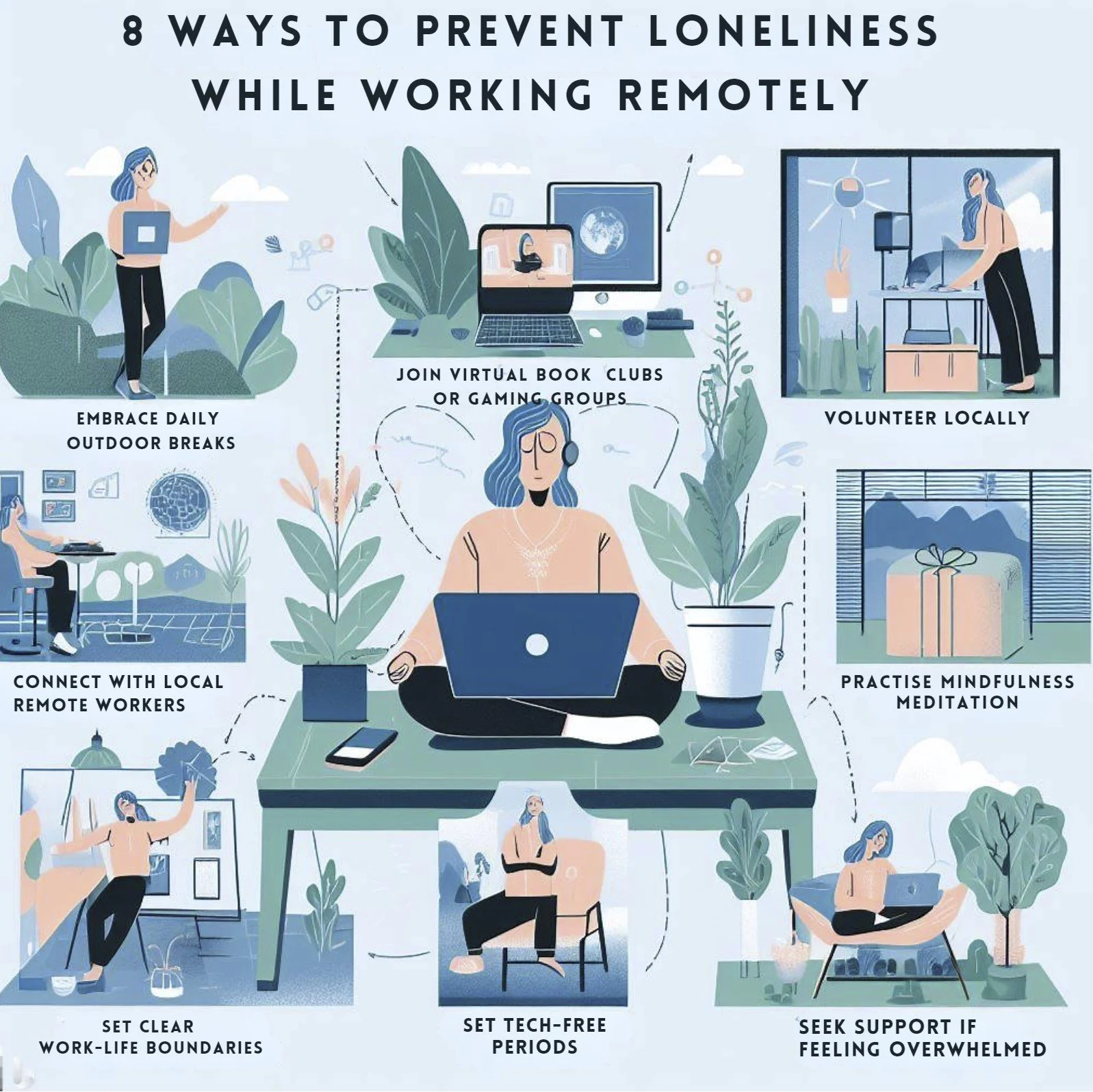8 Proven Ways to Deal With Loneliness Working From Home
/Are you looking for ways to deal with loneliness while working from home? I can help.
Having worked from home myself since 2010 (much of it alone), I know being lonely is a real problem.
Remote workers often find themselves devoid of the casual social interactions of the office - the random coffee breaks, the impromptu desk conversations, and the camaraderie among colleagues.
The void left behind can often fill you with a sense of loneliness, which, if left unaddressed, can fester over time, affecting both your mental well-being and the productivity.
And the research backs it up:
A 2023 survey by PromoLeaf found that 39% of female and 53% of male remote workers reported struggling with loneliness.
In Buffer's State of Remote Work survey of 2023, 23% of remote worker said they struggle with loneliness.
The good news is that loneliness is something that can be tackled, even if you’re at home and don’t have much time to spare.
I’ve got plenty of detailed advice to help you stave off loneliness as a remote worker. Keep reading for my full list of suggestions and plenty of advice.
At A Glance: 8 Top Tips to Help Loneliness While Working From Home
Short on time? Here’s a brief list of my suggestions to help prevent work-at-home loneliness. Keep reading for more detail on each and the hows and whys on how they can help.
Embrace change by alternating workspaces or redecorating your home office to foster new sensory experiences and stave off feelings of isolation.
Incorporate outdoor breaks and fitness activities into your daily routine to connect with nature and promote mental well-being.
Engage with local remote workers, participate in skill-building meetups, and collaborate on personal projects to maintain a community connection.
Join virtual book clubs or online courses with active communities to promote personal growth and social interaction.
Dedicate time to volunteer work, locally or online, to find a sense of purpose and community.
Practice mindfulness or meditation to manage feelings of loneliness and improve your overall mental health.
Set clear boundaries between work and personal life to ensure you have time to recharge.
Don't hesitate to seek support from friends, family, or mental health professionals when feelings of loneliness become overwhelming.
Strategies to Combat Loneliness While Working Remotely
Now, let’s look at each of the strategies above in greater detail.
Switch Up Your Work Environment
Changing up your work environment can play a crucial role in mitigating feelings of isolation and creating a less lonely work experience, especially when working from home. Let's delve into the various aspects:
Breaking Monotony and Fueling Imagination:
Whether it's a cozy coffee shop, a sunny outdoor patio, or a vibrant co-working space, these new settings can fuel your imagination, spark new ideas, and provide fresh sensory experiences that can be invigorating.
Encouraging Social Interaction:
When you step out of the solitude of a home office, there's a natural propensity for social interaction. Alternate workspaces can be designed or chosen to encourage social interaction.
Positive Impacts on Mood and Stress Levels:
Even small changes like redecorating your home office can have substantial benefits. Incorporating elements like houseplants can enhance the aesthetic appeal of your workspace and positively impact mood and stress levels.
2. Spend Time Outside And Exercise
Establishing a health-conscious routine is an important strategy to alleviating feelings of loneliness and fostering mental well-being. Here are three pivotal aspects:
Daily Outdoor Breaks:
Stress Reduction: Spending time in green spaces has been associated with lower levels of stress and a better mood, providing a natural escape from the confines of a home office.
Boosting Mood: Sunlight exposure increases the production of serotonin, a hormone that enhances mood and fosters a sense of calm and focus.
Virtual Workout Groups:
Community Building: Virtual fitness programs emulate the camaraderie of physical gym settings, offering a communal experience that can alleviate feelings of loneliness.
Individual Fitness Activities:
Physical and Mental Well-being: Engaging in individual fitness activities like walking or practicing yoga outdoors promotes physical health and provides a connection to nature, enriching mental well-being.
3. Expand Your Social Circle
Expanding your social circle locally, especially when working remotely, can significantly contribute to alleviating feelings of loneliness. Here are some ways to do it:
Local Networking Opportunities:
Networking with neighbors or local remote workers can provide a sense of community, which is vital for mental and social well-being. Such networking opportunities could lead to friendships or professional connections that enrich your social life and provide a support system.
Collaborative Projects and Meetups:
Engaging in collaborative projects, DIY co-working sessions, or skill-building meetups can provide opportunities for social interaction and community connection. Participating in such activities can help maintain a community connection, which is crucial for mental well-being and can help combat loneliness.
4. Develop Yourself Personally and Professionally
Taking part in activities that nurture personal interests and skills can act as a significant step towards countering the loneliness and isolation that can come with remote work. Here are some examples:
Joining Virtual Book Clubs:
Social Interaction: Virtual book clubs provide a place for you to interact, discuss, and share ideas with like-minded people; creating a sense of community and reducing feelings of loneliness.
Enrolling in Online Courses with Active Communities:
Skill Development: Online courses, like those on Coursera, provide a structured way to learn and improve skills which can be help in career development and personal satisfaction.
Community Engagement: Active communities within online courses offer a platform for learners to interact, collaborate, and support each other, fostering a sense of community.
5. Volunteer in your Community
Engaging in volunteer work, whether locally or online, is a great way to combat feelings of loneliness, especially when you work remotely. Here are three key points that highlight the benefits of volunteering:
Social Connection and Community Engagement:
By working alongside others towards a common goal, volunteers foster social connections and community engagement.
Sense of Purpose and Fulfillment:
Contributing to a cause or community through volunteering can provide individuals with a sense of purpose and fulfillment.
Mental Health Benefits:
The act of helping others and the positive social interactions that come with volunteering can significantly improve your mental health and overall well-being.
6. Try Mindfulness and Meditation
Engaging in mindfulness and meditation can work as a powerful remedy to the feelings of loneliness and stress that often come with remote work. Here's how:
Alleviating Loneliness:
Meditation has been recognized for its potential to alleviate loneliness, by fostering a connection between the mind, body, and behavior.
UCLA Health also reported that a two-month program of mindfulness-based stress reduction was shown to decrease feelings of loneliness among participants.
7. Maintain A Work-Life Balance
Maintaining a work-life balance, particularly while working remotely, is crucial for both mental and physical well-being. Here are some points elucidating the importance of protecting your work-life balance, backed by high-ranking sources:
Reduced Loneliness:
Work-related loneliness can significantly impact the perception of work-life balance. When you feel lonely due to a lack of social interactions at work, it can blur the boundaries between a professional and personal life, and have a negative effect on your wellbeing.
Establishing a clear schedule with dedicated hours for work and personal activities is fundamental for achieving a balanced routine.
8. Reach Out For Help
If your feelings of loneliness become overwhelming, it's important to reach out for support from friends, family, or mental health professionals. Engaging in real conversations about your emotional state is important for several reasons:
Validation and Understanding:
Sharing your feelings with others can provide validation, as they may have experienced similar emotions or situations. Being understood can be comforting and help you feel less alone.
Professional Support:
Mental health professionals can provide support, coping strategies, and potentially treatment for underlying issues like depression or anxiety.
Psychology Today suggests that understanding and addressing the cause of loneliness is essential, and mental health professionals can provide the necessary support to explore and address these feelings in a safe, supportive environment.
Dealing With Loneliness Working At Home: Conclusion
The journey of navigating through loneliness while working from home can be challenging. However, with the right approach and a supportive community, it's a journey that can lead to personal growth and improved mental well-being.
Now's the time to take action. Implement the strategies discussed, engage with supportive communities, and take steps towards creating a more socially enriching and mentally nourishing remote working environment.













